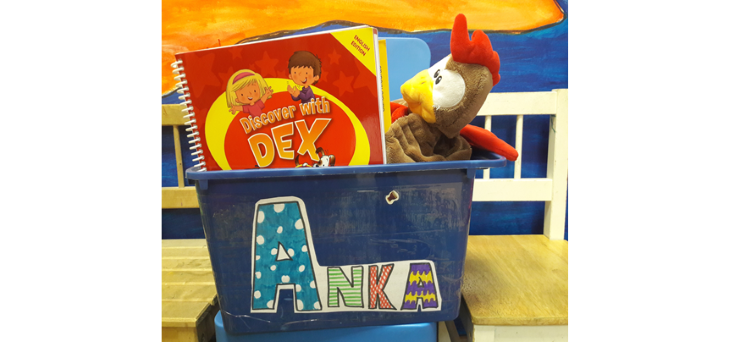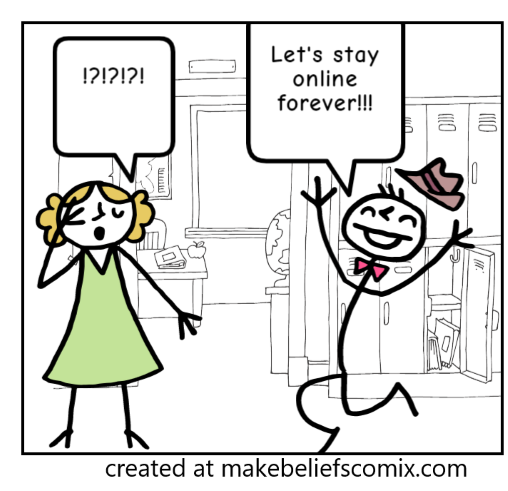To online or not to online, that is the question?
No, not really. That, for sure was never a question!
Not for me, that is. I am a dinosaur teacher and I had always been against teaching pre-schoolers online. Or, actually, teaching online in general. If, before the 15th of March 2020, you had asked me what I thought about it, my answer would have been as short as it would have been decisive. No.
No. No. No.
I love my beautiful classroom, all the puppets, the flashcards…My rucksack that makes me look and feel like a proper Mary Poppins, the box with all the precious junk. How we sit in a circle to read a story and how we make stuff or play with a Magic Bag…

But, then, hey-ho, the pandemic happened and I and we just moved online. Just like that. Just to prove that the EFL teachers are the most amazing species. Just to see whether one can, in fact, develop professionally, at a head-spinning pace, learning about new approaches, techqniues, platforms, games, tools, tricks, websites, solutions…and about their effective use in the online EFL lesson.
Yes, indeed, one can. In March many of us (including myself) had very little or no idea about the online classes but look at us now. Superheroes!
But guess what? The Universe had other surprises in store for us (I mean, of course, it is 2020, the year of surprises), like this idea, here…

‘Can we just stay online?’
I don’t know about you but I have spent the last 100+ days dreaming and daydreaming of going back offline. But while I was doing this, the other stakeholders had their own ideas and this is how we (the parents, the admin and the Mary Poppins here) found ourselves discussing the options and, actually, willingly, considering choosing to stay online with the youngest children, regardless of the situation in the city.
Well, that was a bit unexpected, to put it mildly. However, once I got past the stage of the initial shock, I was able to look at it all in a more objective way (as in: not blinded by my own old age and stubbornness:-) and actually see some of the benefits, for all of us.
So here goes, in no particular order
Pre-primary online is better because…
- We can do it! A good quality online classes for pre-schoolers are not a marketing spin. Impossible is nothing! We learn, we are engaged, we have fun, we produce, we develop, we bond. We are loving it and we are looking forward to the next one. You only need to want to make it work and just like with the regular classes, everyone needs time to get used to each other, the routine and the rules of the game.
- It’s virus-free. Covid 19 aside, little children get ill more frequently. That’s just the way it is. It does happen that they might not be entirely healthy when they come to their afternoon English lesson or that, being ill, they miss a lesson here and a lesson there and they do not make as much progress as they could have. The online classroom is a perfect solution here: we can all participate, even if we sneeze and cough and the school and the teacher do not lose money over the classes that would have to be cancelled.
- It lowers the affective filter. There were a few students in my groups this year who definitely benefitted from moving online. In the classroom, they were amazing and a pleasure to teach. They participated but at the same time struggled, now and again, with being separated from mum. They simply flourished in the online classroom. I can see how much more confident and at ease they are, sitting in their own chairs, in their bedrooms, with cats, toys and, most importantly, with Mum at an arm’s reach. What’s not to like here?
- It is less stressful for the teacher. It is a little know fact that VYL teachers, in the course of their career, develop a set of eyes around their heads and can produce a pair of additional arms, on request. They are ready for everything that is happening, for everything that is to happen and for everything that might potentially happen, too. Why? Because acting in loco parentis is a huge responsibility. And a lot of stress, even for those experienced teachers. The online classroom comes with an army of the best teaching assistants there are: mums, dads, grandmas, sisters, brothers and nannies. The kids are safe, every single one of them.
- Parents like being in the classroom. So far, the classroom has been this galaxy far-away which the parents had no or very little access to. Of course, teachers talk to parents, they explain the homework, they give feedback. They share songs and send out the invitations to the open lesson, twice a year. Now, however, the whole course is one big open lesson and the parents are a part of it. More even, they are having fun. Not because they want to interrupt or tell the teacher off, not to take over and not because they do not trust the teacher and would rather keep an eye on things. It’s because they can finally see how their children operate in the world of the foreign language, how they become more independent and how they are learning new things and making progress.
- Parents can get properly involved now. The parents are there, they learn our songs, they play our games and they see exactly what we practise and how. If there is time and willingness, they can easily extend the English lesson time, take it ‘out of the classroom’, this way contributing to their children’s progress. During the lesson time, they can be involved in too, helping the teacher model the activity but also helping their child understand that, yes, you can sometimes speak to your mum in English, too.
- Flexibility and frequency. 45 minutes in the real classroom is just enough for the little people. 45 minutes in front of the computer screen might be a challenge, especially if they audience is only 3 or 4 years old. For that reason, we decided to experiment and chop the lesson time into smaller bites. Now we meet for thirty or even fifteen minutes at a time but more often. The students are involved throughout and stay focused, the financial expenses or profits are the same, and such lessons are very easy to plan. The most important thing, however, for me as a teacher, are the benefits for the learning process. When you are 5, you learn quickly but you also forget quickly, so by increasing the frequency of the lessons, we create better conditions for learning and can expect better results. It is already happening!
- The lesson time = the speaking time. The ‘time constraints’ mentioned above as well as the online format had an impact on the lesson structure and routines. The students have the coursebooks but it is used only at home, for revision and for homework. When we meet in our online classroom, it is to learn new things, to listen, to sing and to speak and speak and speak. And I really like that way.
Much to my amazement, I am a happy online teacher but that doesn’t mean that I have stopped dreaming about the offline world or that any decisions have been made. It’s too early, anyway, so I am still on the fence, just ‘sitting, waiting, wishing’, like in a song.
What about you? Has this been your experience, too? Have you noticed any other benefits of the pre-primary EFL online classes? I would love to hear from you.
Happy teaching (online or off:-)
I’m not convinced when it comes to the little ones (3-6). I had a fair share or successes and failures during the pandemic. Basically, my experience is that if the language is there, e.g. you have an ESL kid, then you can swing it easily. If you have an EFL pre A1 kid, then online classes can be a source of torture for both you and the child. However, online is a viable option with older kids, 8 and up.
Thank you, Vita! I have been thinking about it and I have to admin that I might have just been lucky. Both my pre-schoolers and primary have been going almost too well…I am happy, of course, but that has also been a big surprise.
I found this post fascinating, especially because we’re thinking about having our youngest age groups fully in the classroom from September if we’re able to, whereas those who are 8+ will be in groups which are half online and half face-to-face (one class of each per week). Here are a few extra questions I’d like to know the answers to. Did you start teaching any brand new VYLs during this time, or were they all students you already knew? What roles did/do the parents play during the lessons themselves? Are they individual or group lessons? If they’re groups, how many students? How often do you teach them?
Thanks!
Sandy
Hello Sandy!
I was very surprised when this request and suggestion came from the parents. I am happy because that means that for them (and for the kids) that has been a positive experience. I am still in two minds and very much on the fence.
As for the kids that I have been teaching, I have two individual students (twice a week) and two small groups of 4 (two and three times a week). Some of them have been my pre-pandemic students and that made everything much easier but some new students joined, too. However, although they had not been taught by me personally, they had been our students so there had been some classroom experience. And that must have helped.
The parents have been amazing although for them this was a brand new experience. They are around although I do not see them and they get involved only when there is a problem. I had a situation when there was too much help with something that the child could do herself but I just wrote a message, explained I would like them to do (or not to do) and why and that was enough. Sometimes they play with us and answer questions (especially the parents of the individual students), they help with the craft (the preparation stage, especially).
I have had an interesting case of a 4-year-old whose mum prompted her (too often, too instantly), which created a situation when the student became over-reliant on mum. Until the one day when mum was absent and another adult was supervising and did not help. The little girl, without the support, all of a suddent started to produce herself…Again, explaining that to parents and what we do and why did help:-)
Half and half for the 8+ is an interesting idea! Are you going to adapt the pacing schedules and the programmes to better suit the online or offline format? Writing only in the classroom? How do the parents respond to that?